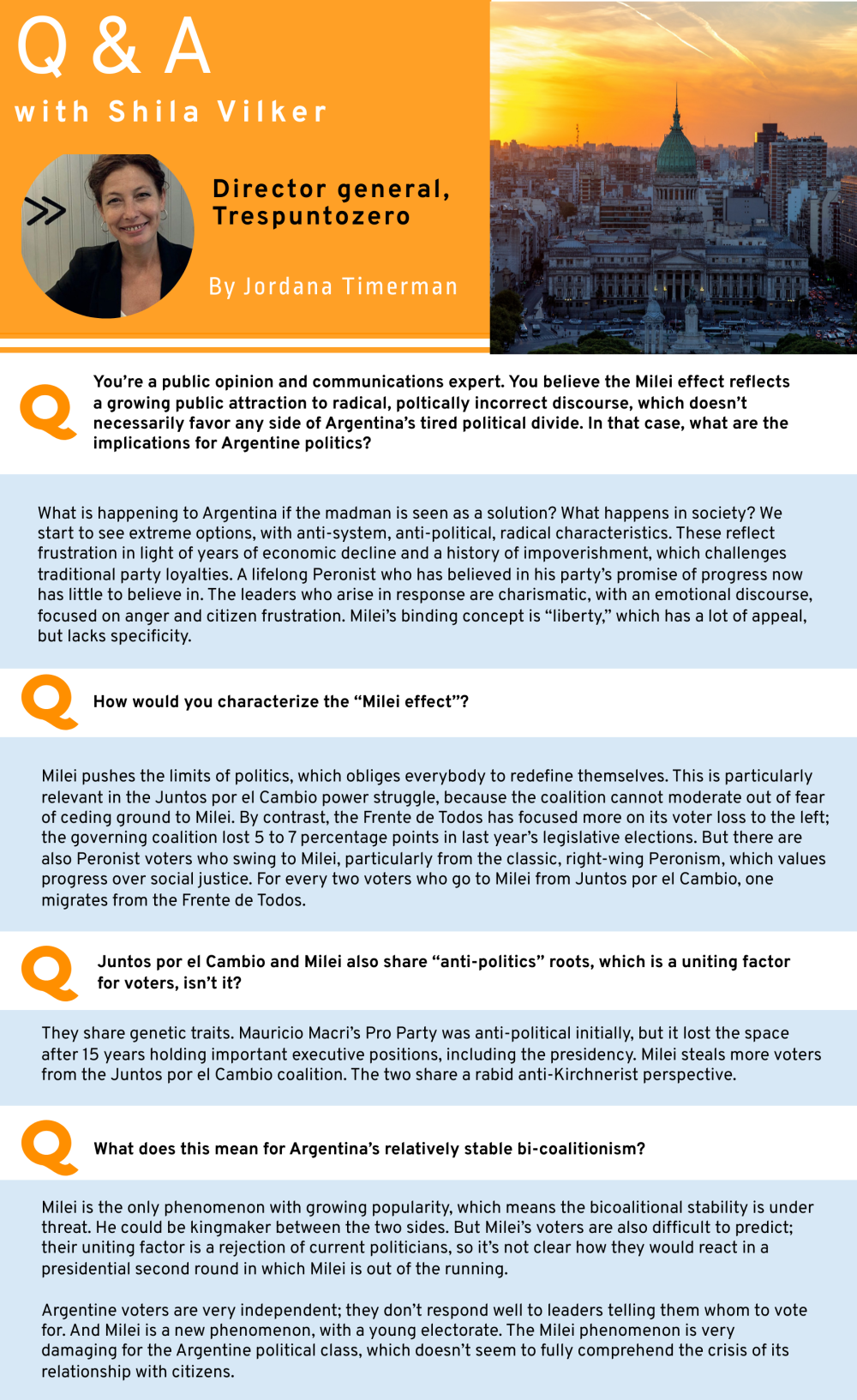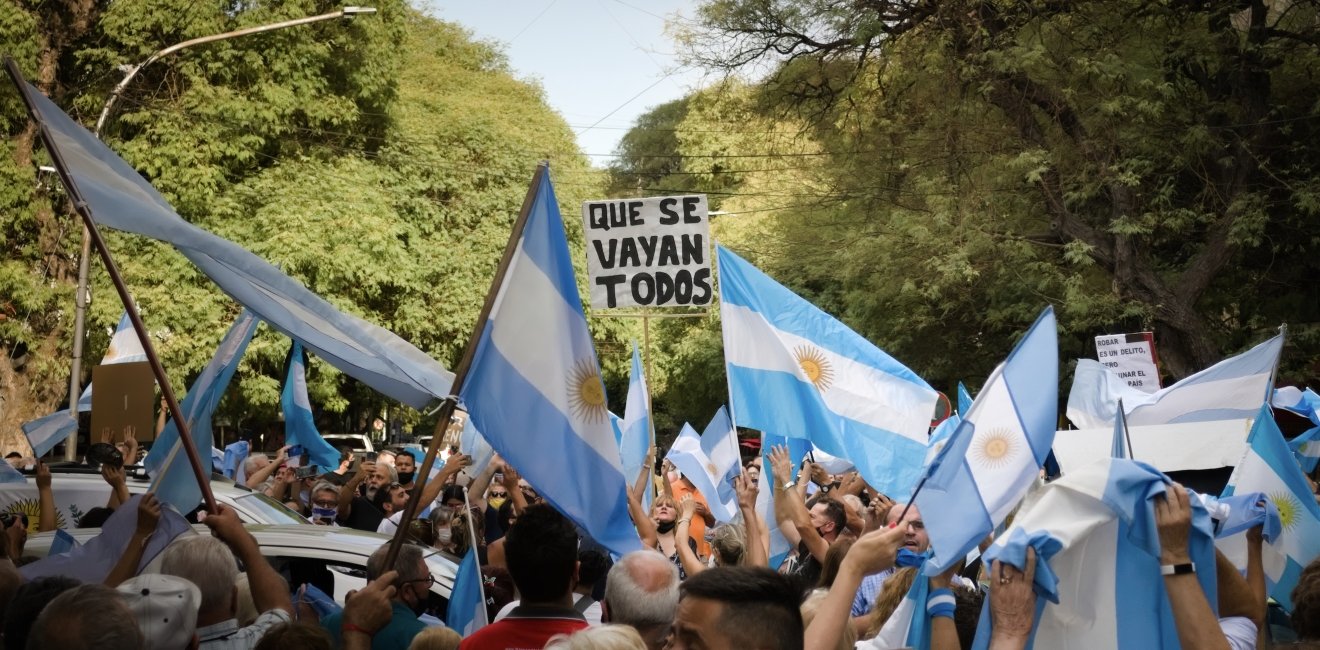
A blog of the Latin America Program
BUENOS AIRES – Lawmaker Javier Milei, with his mop of unruly hair and ostentatious political incorrectness, seems like an unlikely answer to Argentina’s seemingly perpetual crisis. But the 51-year-old libertarian economist is challenging the country’s established political coalitions ahead of next year’s presidential election. While unlikely to win, his popularity points to growing dissatisfaction with political elites, and suggests the anti-establishment currents coursing through the region might finally be coming for Argentina’s political class.
Like most political outsiders who have cropped up internationally, Milei seems more like a caricature than a serious candidate. But if recent years have taught us anything, his unconventional appearance and impractical ideas don’t preclude winning elections. Like Donald Trump in the United States and Jair Bolsonaro in Brazil, Milei has weaponized anger at political elites and captured the hearts of (largely male) voters who feel cheated by the “system.”
While unlikely to win, his popularity points to growing dissatisfaction with political elites, and suggests the anti-establishment currents coursing through the region might finally be coming for Argentina’s political class.”
Milei’s tirades against the “political caste” position him firmly as an outsider; indeed, he held no elected position until winning a seat in Argentina’s House of Deputies in last year’s legislative election. Painting career politicians as grifters, he assures supporters he has become involved in politics only to overthrow the “caste.” At rallies, his supporters shout, “la casta tiene miedo” (the caste is afraid). Like many outsiders, he feels at home on social media, where he has held raffles to award his salary to supporters.
Until recently, it was easy to dismiss Milei. Despite a tumultuous economy, Argentina’s politics have been surprisingly stable of late. Together, the country’s two major coalitions – the Peronist Frente de Todos and the opposition Juntos por el Cambio – dominated the 2019 election and the 2022 midterms. Iterations of the same parties have led the country for 20 years. Argentina has avoided the social unrest that has upended South American politics from Chile to Colombia over the last four years. Buenos Aires sees plenty of protests and cacerolazos, but chants of ¡Que se vayan todos! have been rare since 2001.
Iterations of the same parties have led the country for 20 years. Argentina has avoided the social unrest that has upended South American politics from Chile to Colombia over the last four years.”
These days, however, Milei is hard to ignore. He came in third last year in the capital city’s legislative elections, and polls put his support in next year’s presidential race at 18 percent. At minimum, he could well be a kingmaker in a second round of the presidential contest.
Milei’s image is strengthened by comparison to the infighting and stagnation that has come to characterize the Frente de Todos and Juntos por el Cambio. As Argentina slides deeper into an economic crisis with enormous social costs, the country’s political establishment is consumed by internal leadership battles and sniping both among and within political factions. Peronism is a circular firing squad, riven by squabbles over Argentina’s latest International Monetary Fund program. The opposition is perpetually wrangling over its 2023 presidential candidate and the balance of power between the Propuesta Republicana and Unión Cívica Radical.
As Argentina slides deeper into an economic crisis with enormous social costs, the country’s political establishment is consumed by internal leadership battles and sniping both among and within political factions.”
As a result, Milei’s seemingly fanciful campaign has the very real potential to influence the frontrunners.
That is particularly true for Juntos por el Cambio. Milei has poached voters from both coalitions, but he is most appealing to the far-right wing of the opposition. His candidacy has pushed the opposition rightward in a bid to prevent voters from migrating to Milei. He is doing his best to promote that trend; Milei has expressed a strong preference for the conservative Juntos por el Cambio leader Patricia Bullrich over the center-right Buenos Aires mayor, Horacio Rodríguez Larreta, as the two vie to be the coalition’s presidential candidate. Milei denigrates Rodríguez Larreta as a member of the “caste.” By contrast, his warmth toward Bullrich led her recently to float the possibility of a potential alliance.
Milei’s seemingly fanciful campaign has the very real potential to influence the frontrunners.”
Milei’s impact on the governing coalition is less clear. President Alberto Fernández and Vice President Cristina Fernández de Kirchner are mired in their own power struggle. They are most concerned about protecting their left flank; in the midterms, the Trotskyist Workers’ Left Front won the third-largest share of votes nationally. The government has no interest in Milei’s policy proposals, including dollarizing Argentina’s economy and eliminating the Central Bank to bring inflation under control.
Meanwhile, Milei himself appears to be moderating. In a recent interview, he said his “revolution” would preserve the country’s costly but popular social aid programs. That suggests he might be reaching the limits of support for radical change. Indeed, other potential presidential candidates for 2023 are familiar faces, including the president; the vice president; the vice president’s son, Máximo; and a handful of moderate Peronists such as House of Deputies President Sergio Massa, former Salta Governor Juan Manuel Urtubey, San Juan Governor Sergio Uñac and Marco Lavagna, the director of the national statistics agency.
Though it’s still early, and Milei is getting a lot of attention, Argentines do not appear ready to gamble on dramatic change, as voters did in the last elections in Brazil, Chile and Peru.

Author

Latin America Program
The Wilson Center’s prestigious Latin America Program provides non-partisan expertise to a broad community of decision makers in the United States and Latin America on critical policy issues facing the Hemisphere. The Program provides insightful and actionable research for policymakers, private sector leaders, journalists, and public intellectuals in the United States and Latin America. To bridge the gap between scholarship and policy action, it fosters new inquiry, sponsors high-level public and private meetings among multiple stakeholders, and explores policy options to improve outcomes for citizens throughout the Americas. Drawing on the Wilson Center’s strength as the nation’s key non-partisan policy forum, the Program serves as a trusted source of analysis and a vital point of contact between the worlds of scholarship and action. Read more


Argentina Project
The Argentina Project is the premier institution for policy-relevant research on politics and economics in Argentina. Read more

Explore More in Weekly Asado
Browse Weekly Asado
Dengue Haunts South America’s Summers

Lessons from Costa Rica’s Economic Transformation

Women and Latin America’s Digital Revolution

